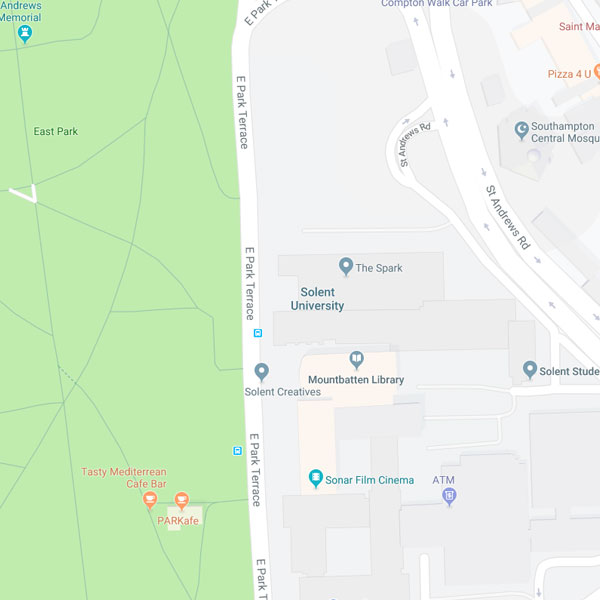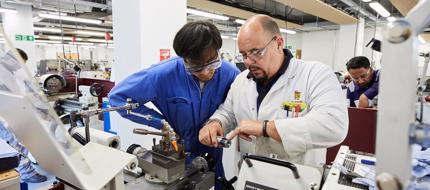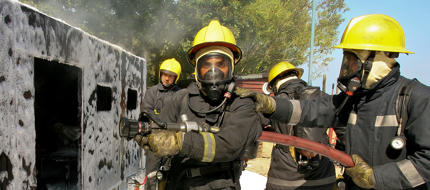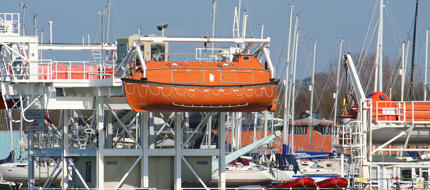About this course
Build the foundation of a great career as a marine electro-technical officer in the dynamic maritime industry - the backbone of modern international trade. Supported by a sponsoring company and offering extensive hands-on training at sea on real working vessels, this industry-recognised cadetship provides all the skills, knowledge and experience you will need to become a certified Engineer Officer of the Watch.
You will learn to maintain on-board control engineering and electronic systems, including propulsion control, radio communications and electronic navigation aids, as well as the confidence and know-how to maintain a wide range of electrical and electronic equipment to maximise the operational safety and efficiency of a seagoing vessel.
Shipping out as an engineering officer cadet on a range of vessels owned or operated by your sponsoring company, you will develop the essential skills, knowledge and behaviours needed to become a marine electro-technical officer in the Merchant Navy – acquiring a range of practical skills appropriate to operating and problem solving for ships’ electrical, electronic machinery and systems in a safe and efficient manner.
As part of your cadetship, you will gain your first qualification as an Engineer Officer of the Watch – and be equipped with all the knowledge and understanding you need to undertake tasks as detailed in the industry-based onboard training – and with academic exemptions for further professional qualifications under the internationally recognised Standards of Training, Certification and Watchkeeping (STCW) and UK Maritime and Coastguard Agency (MCA) regulations.
This programme is aligned to the new UK-wide maritime officer cadetship syllabus developed by the Cadet Training and Modernisation (CT&M) Programme, led by the Maritime and Coastguard Agency (MCA). Effective from September 2025, the new syllabus reflects the current practices and technology used aboard modern vessels and supports the development of 'human element' skills - essential learning for today’s aspiring officers.
Certificate in Practical Artificial Intelligence
Every student at Solent University will also have the option to study an additional Certificate in Practical Artificial Intelligence qualification alongside their course. Free of charge, the course ensures you'll be prepared for a fantastic and varied career after graduation.
What you'll study
Phase 1
- 27 weeks (this is approximate and subject to change)
- Introduction to Engineering Mathematics
- Introduction to Marine Electro-Technology
- Introduction to Marine Engineering Systems and Legislation
- Introduction to Engineering Science
- MNTB Workshop Skills and Technology
- Basic Safety Training Week (BSTW) (STCW short course)
- Proficiency in Designated Security Duties (STCW short course)
Phase 2
- 28 weeks (sea phase lengths are approximate and subject to change)
- MNTB Engineer Training Record Book
- Consolidation of underpinning knowledge (UPK)
Phase 3
- 32 weeks (this is approximate and subject to change)
- Maritime Electrical Machines
- Maritime Mathematics for Engineers
- Maritime Thermodynamics and Mechanics
- Operational Electrical and Electronic Control Systems
- Operational Marine Engineering Knowledge
- Operational Maritime Law and Project Management
- Operational Naval Architecture and Stability (Engineering)
- MNTB Workshop Skills
- High Voltage (Operational) (STCW short course)
- Advanced Fire Fighting (STCW short course)
- Medical First Aid (STCW short course)
Phase 4
- 30 weeks (sea phase lengths are approximate and subject to change)
- MNTB Engineer Training Record Book
- Consolidation of UPK/IAMI Engineering Knowledge, and MCA Orals preparation
Phase 5
- 34 weeks (this is approximate and subject to change)
- Applications of Power Electronics in Electrical Motor Drive Systems
- Distributed Control Systems and High Voltage Systems
- Marine Navigation and Radio Communication Systems
- Maritime Electrical and Electronic Control Systems
- Power Electronics and Logic Controllers
- Shipboard Management
- Marine Analogue and Digital Electronic Principles
- Completion of MNTB Workshop Skills
- Preparatory courses for IAMI Engineering Knowledge and MCA Orals exams
- Human Element, Leadership and Management (Operational) (STCW short course)
- Proficiency in Survival Craft and Rescue Boats (STCW short course)
- High Voltage (Management) (STCW short course)
How you'll study
Where you'll study
The classroom teaching and workshop instruction for this course is delivered from Solent University's East Park Terrace campus, located in Southampton city centre. All mandatory STCW maritime safety training courses are delivered from the Warsash campus.

Facilities
How to apply
Entry requirements
Four GCSEs at grade 4 or above, including mathematics, English and science (with a significant physical science content).
Medical requirements
Officer cadets must be in good health and capable of passing the Merchant Navy Medical Examination (ENG1).
Anyone contemplating a career as a ship’s officer would be well advised to take a medical examination and sight test as soon as possible to find out if there are any physical bars to their career aspirations.
The MCA holds a list of approved doctors throughout the UK who are able to provide ENG1 seafarer medical examinations. This list can be found here.
Nationality
British shipping companies will normally only recruit UK or European Union nationals. However, the MCA certificates of competency may be awarded to people of any nationality and the training programmes are open to all.
A potential international candidate from outside the UK and EU should secure sponsorship from a suitable shipping company that will be able to provide appropriate sea service as part of the cadetship programme.
International students should also hold a formal International English Language Testing System (IELTS) certificate of at least 5.5, as a good knowledge of written and spoken technical English is required to commence the programme.
Application and sponsorship
To apply for an HND in Marine Electrical and Electronic Engineering, you must undertake a three year engineer officer cadet training programme approved by the Merchant Navy Training Board (MNTB) and meet the academic entry requirements as stated.
The next step is to find a company to sponsor you so that you can complete the sea service elements of the training programme. You should apply direct to the sponsoring companies for details of their recruitment policies and the availability of sponsorship.
There are a number of UK sponsoring companies that recruit UK/EU nationals as officer cadets to work in the various shipping sectors of the merchant navy (for example, cargo, container, cruise, tanker etc.), either individual shipping companies recruiting to fulfil their own staffing needs or training organisations that recruit on behalf of their clients.
Companies normally start the recruitment process around January each year for entry in the following September or January.



